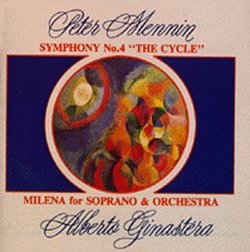For Ginastera
Discophage | France | 05/04/2007
(4 out of 5 stars)
"Peter Mennin's Symphony No. 4 "The Cycle" for chorus and orchestra was completed in November 1948 and given its first performance under the direction of Robert Shaw on March 18, 1949. The text is by the composer himself. The cycle from the title is that of time, of nature and human destiny ("Time passing, waters flowing, / The great cycle begins once more, / Washing stains away"). The two outer movements are vigorous in rhythm, brassy in orchestration and alternately angry and heroic in character, framing a broodingly lyrical second movement. Though well crafted, the music is never very original and, for all its dramatic vigor, it doesn't stand out from similar symphonic compositions written in the 40s by Harris, Piston, Barber, Schuman. I also find the treatment of the chorus somewhat heavy-handed and didactic, and rather thick and unsubtle in texture. Phoenix must be thanked for providing the text, which otherwise would not always be intelligible. Still, this can have some appeal for those with an interest for the history of symphonic writing in the USA.
Alberto Ginastera's Cantata "Milena" is the reason to buy this disc. Inspired by the passionate and desperate letters of Kafka to Milena Jesenska, it was composed in 1971. A mood of pent-up mystery is established at the beginning, with a haunting and melismatic line sung by the unaccompanied soprano, picked up by a pedal of hushed strings with mysterious punctuations from the percussion, evoking some of George Crumb's compositions after Llorca. The text is partly spoken and sometimes delivered in a "Sprechgesang" style. The music often recalls Berg's Lulu and has the same kind of tense lyrical quality, but its language is more advanced than Berg's, especially in the more dramatic outbursts, which brought to my mind the music of Bernd-Alois Zimmermann ("Die Soldaten") and the kind of contemporary music composed in Europe in the 70s. The music is not "pretty" and easy-listening, as seems to be required of contemporary music nowadays, but Ginastera never sacrifices drama and expression. Phyllis Curtin sings beautifully. Unfortunately Phoenix does not provide the text for the songs (sung in Spanish). Other than that, the notes are synthetic but informative.
Phoenix does great service to the music lover by reissuing these recordings and others from the Desto and Everest labels on CD, but they deserve a rap on the knuckles for providing such stingy total time (47') and no information on the recording dates and provenance. Both compositions originated as Desto LPs, "Milena" with, of all couplings, Chopin's 2nd Piano Concerto, and the Mennin Symphony with a rarity then and still now: Czerny's Piano 4-Hands Concerto, Op. 153. They were recorded somewhere between 1971 and 1975.
"
Mennin & Ginastera
Francisco J. Muņoz | Santa Cruz, Bolivia | 06/15/2000
(4 out of 5 stars)
"Peter Mennin, no obstante, de ser uno de los grandes compositores norteamericanos en la actualidad su música es desconocida para la mayoría de los aficionados a la música, inclusive dentro de los mismos Estados Unidos. Su cuarta sinfonía para orquesta y coro, es de una belleza peculiar, muy al estilo de su compositor con la característica de muchos compositores norteamericanos "Música optimista" con mucha FE en el ser humano. Mennin en el transcurso de toda su vida sólo publicó alrededor de 30 obras, puesto que era muy exigente con su propia obra y esto le da un certificado de calidad, yo dentro de mi experiencia con la música de Mennin puedo afirmar que todos las obrar que he escuchado de él son de muy buenas para arriba. La obra de Alberto Ginastera, (Compositor argentino), Milena es una obra inspirada en cartas que escribiera el escritor checoslovaco Franz Kafka a una amiga de juventud y publicadas como "Cartas a Milena". La obra es para orquesta y soprano, la parte cantada es más bien recitada un poco al estilo de Pierrot Lunaire de Arnold Schoenberg, sin ser una gran obra evidentemente tiene gran mérito, en la parte final la orquesta toca el tema del ultimo lieder del Winterrise de Schubert, el tema del organillero, que es símbolo de la muerte para Ginastera.Compre este disco mientras pueda, pues dudo que esté mucho tiempo en catalogo!"


 Track Listings (2) - Disc #1
Track Listings (2) - Disc #1